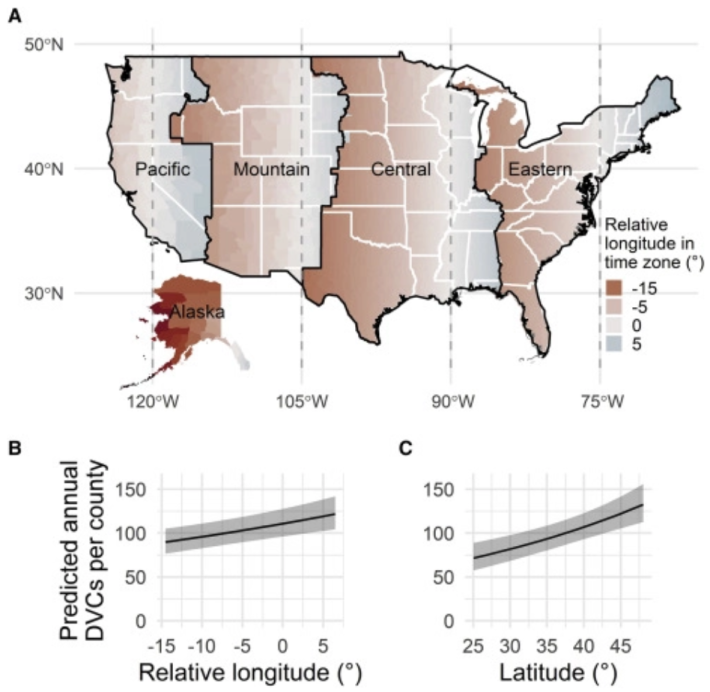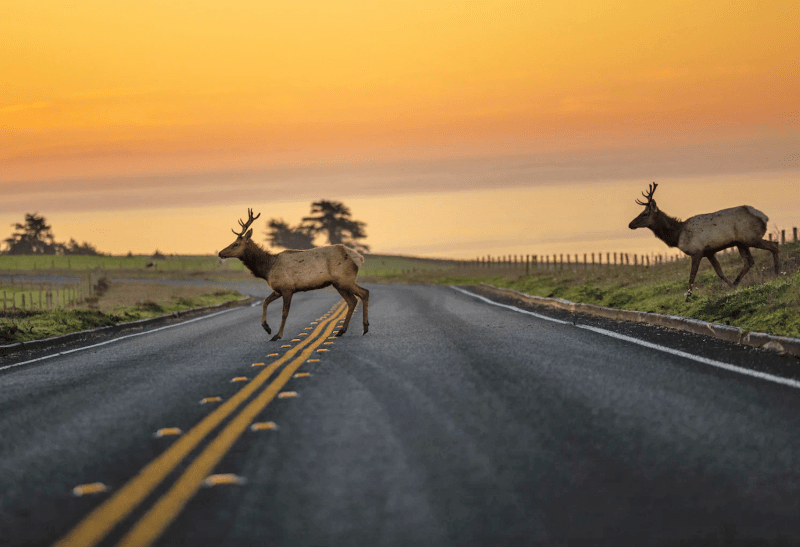Rolling back the clocks in November may give millions of Americans an extra hour of sleep, but it also costs human and animal lives on U.S. roads that could be saved by making daylight savings time permanent, a new study argues.
In a new paper in Current Biology, a team of University of Washington researchers found that 36,550 deer and 33 human lives could be saved in deer/vehicle crashes simply by not setting America's clocks back in the fall, when many species' breeding seasons are at their peak and nocturnal animals are far more likely to cross busy roadways after dark in search of a mate. During the shift from daylight savings time to standard time, that surge of deer crossings coincides with peak commute times at the end of the workday, which explains why 75 percent of deer/vehicle crashes happen at night — but if America "locked the clock," the researchers argue, commuters could make it home before dark, when nocturnal deer species really get moving.

"By targeting the temporal dimension of wildlife-vehicle collisions, strategies such as year-round daylight saving time that reduce traffic during dark hours, especially during the breeding season of abundant ungulates, would yield substantial benefits for wildlife conservation and reduce the social and economic costs of deer-vehicle collisions," the researchers wrote. (Translation: building fences and wildlife crossings are great safety strategies, but we can save lives faster and bring crash costs down by simply getting more drivers where they need to be before sunset, too.)
That finding might seem significant to wildlife advocates, if a little less dramatic for human victims of traffic violence — at least at first. Only about one percent of homo sapiens traffic fatalities in the U.S. involve an "abundant ungulate," and 999 out of 1,000 deer/vehicle crashes do not result in a person's death, even if an estimated 59,000 injuries and $10 billion in economic losses are caused by collisions with deer every single year.
That tiny sliver of deadly crashes, though, still represents the loss of 440 human beings, 7.5 percent of whom might have been saved just by ditching a policy that 65 percent of Americans don't support anyway. And considering that a 2004 Rutgers University study that permanent daylight savings time would cut pedestrian deaths by about 13 percent in the hours around dusk and dawn, it may also represent the tip of a larger iceberg — and signal the need for a conversation about whether saving standard time is worth the human (or animal) costs.
Of course, most traffic safety reformers wouldn't suggest that permanent daylight savings time alone would end dusk and dawn deaths on U.S. roads — and the University of Washington researchers don't either.
Just like all traffic violence, crepuscular crashes are the result of a broad range of policy choices, like the absence of mandatory streetlights, traffic-calming infrastructure, or automatic emergency braking systems on cars — the latter of which which may take a while, considering braking systems doesn't always protect pedestrians — much less deer — particularly well on under-illuminated roads at night. Even the human body's natural tendency to get drowsy as the sun goes down can make streets more dangerous, especially when an inflexible modern work schedule requires commuters to drive when they're tired, or when governments don't provide them with other safe, affordable, and attractive ways to get around.
The Washington researchers point out that a Vision Zero plan for wildlife would involve other systemic strategies, too, like protecting wolves and cougars to naturally keep deer populations in check and influence hooved animals' natural movement patterns. They also note that deer/vehicle crashes disproportionately happen on rural roads that run adjacent to forests — particularly two-lane roads, where 90 percent of such crashes happen — which signals the need for a conversation about why those areas don't have the sustainable transportation systems many of them badly need.
Even if all those systemic factors were addressed, though, it might still be worth considering whether there's a "temporal dimension" of America's traffic violence epidemic that's going unaddressed — and whether a shift to permanent daylight savings time, in concert with other strategies, might stop some of the most senseless killings on US roads.
And when it comes to roadkill, specifically, it could be particularly important: since roughly 50 percent of DVC crashes aren't reported to insurance companies, the researchers estimate that "the number of deer lives saved by permanent DST and lost by permanent standard time could be twice as large as our estimate."






